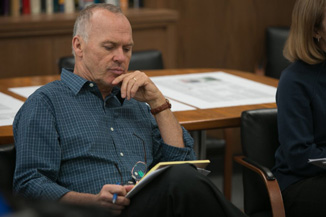Movie Review: Spotlight
By Ben Gruchow
November 27, 2015
BoxOfficeProphets.com

The narrative in question concerns molestation of underage boys and girls by John Geoghan, a member of the Boston Catholic clergy. Although Geoghan’s actions have already been published by the time the movie starts, the story returns to it courtesy of Spotlight - a unit of the Boston Globe newspaper that runs investigative operations undercover, usually over long periods of time. Spotlight is assigned to Geoghan by incoming editor Martin Baron (Liev Schreiber), although Baron takes care to frame it as a request for Spotlight - and specifically Walter Robinson (Michael Keaton) as the leader of the unit - to pick the story of their own volition. An earlier conversation between the two, in which Schreiber implicates in vague terms Spotlight being cut from the paper, underscores the request.
Baron’s also behind the decision that drives most of the film’s main story; rather than attempt to bring the hammer down on a single priest or a single Cardinal in regard to that priest - the logical presumption is that the Church would bury the story and seek retribution - the goal should be to expose the systemic corruption that allows priests to continue to serve despite multiple instances of abuse.
This is a safe target, relatively speaking; it enables the film to posit that the actions of the priests involved aren’t merely the result of individuals making decisions, but also of a rigid and incredibly powerful organization that seeks to protect its own name above anything else, including justice. By keeping the individuals themselves largely off-screen and focusing on the institution, it would already have been able to do this without implicitly excusing the abuse itself. What is shown of the individuals involved is limited to dialogues with several of the victims (now adults of varying ages), and an abbreviated conversation with one of the priests himself. The victims must provide not just the reality of what happened to the journalists, but the detail, and these scenes are harrowing for the simple content, although - strictly speaking - there’s not much of it.
These scenes point the story in a different direction, about the emotional cost of what’s been happening and the mental and emotional state of the individuals involved. This is a direction that the movie pointedly doesn’t follow, for pragmatic reasons, and it more or less clarifies this with Walter’s utterance of the line of dialogue that ends the movie’s trailer: there is a narrative about mental and emotional damage, and there is a narrative about the corruption of the system, and one of the stories is going to be told. It’s the more indirect of the two, and the less interesting; we know what happens from a procedural standpoint, but not from an emotional one.
These examinations are more or less left to the few direct scenes with the victims, and to the one with the priest himself. In this last one, the priest freely admits to molesting children during his time as an active member of the clergy; he doesn’t seem to be aware that he’s done anything wrong, and we remember an earlier telephone conversation with real-life psychotherapist and former priest Richard Sipe, and his conclusion that the individuals who commit these actions attain no more than a 12-year-old’s level of mental maturity in regard to sexuality. It’s probably not the best scene in the film, but it’s the most unexpected, and one with a truly destabilizing effect on what is, on its face, a black-and-white issue. A film that followed this narrative with a deeper exploration of the characters would perhaps be more intriguing from an academic point of view; it would also be narratively much darker, and very difficult to reconcile with the effect that the abuse had on the victims.
The direction that Spotlight does take consists of the team (Keaton, Rachel McAdams, Mark Ruffalo, and Brian d’Arcy James, with John Slattery as Spotlight’s supervisor) taking methodical steps toward discovery, and it follows the rough pattern and rhythm of a procedural; there’s not a lot of variation in speed or rhythm. This does result in an occasional feeling of drift as the narrative unfolds, and it was a little tough for me to keep track, even a couple of days after seeing the film, of the order in which events occur during Spotlight’s investigation. The format also means that we’re generally seeing a lot of functional setups and framing that communicate the story beats without injecting much in the way of personality.
Both of these, I’m fairly sure, are by design; although we get a few moments of unvarnished emotion (it’s mostly from the victims, with Michael Rezendes offering the most outwardly rattled persona), the movie mostly keeps us at arm’s length, refusing to provide an easy answer or an outlet through a scene or line of dialogue. It plays fair by doing this; the victims, after all, didn’t get absolution so easily (if they got it at all), and the individuals committing the abuse don’t obtain insight into themselves, or the proper therapy, for years if ever. This is perhaps the only way that Spotlight could get under the viewer’s skin once you get beyond the immediate storyline that everyone knows from the trailers; it does this skillfully, if not flawlessly. Ruffalo, Keaton, and McAdams are the only core cast members who really register consistently; d’Arcy James, Slattery, and Schreiber’s characters only really feel like they exist when they’re on-screen, and Billy Crudup as settlement attorney Eric MacLeish doesn’t get that.
The movie ends with a true-to-life fact printed across the screen that plays as darkly humorous when you consider the nature of the Church bureaucracy as the film’s real adversary. Spotlight ultimately avoids a conclusion on where this sort of thing ends up, because it’s not really in the hands of any party that can be made to do the right thing.